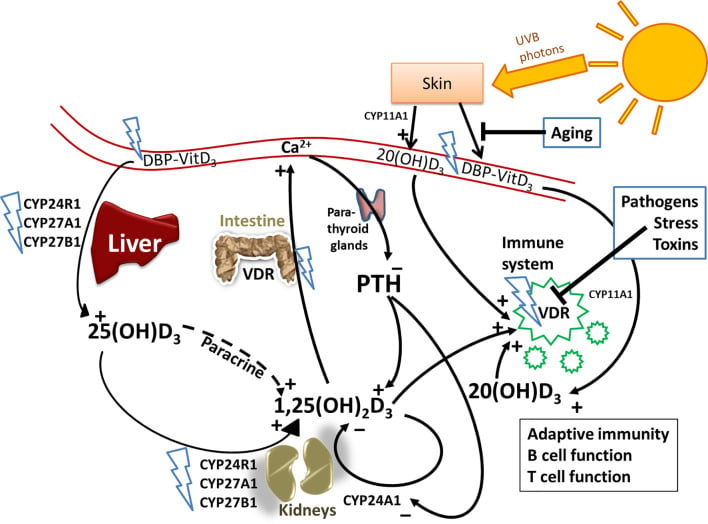Medical content is for information only - not a substitute for professional guidance.
How the Coimbra Protocol Works
Effect of vitamin D on the immune system
"The vitamin D in its immunoregulatory role potentiates the normal functions of the immune system and blocks the recognizably abnormal activities, which are now identified as 'Th17 reactions' by immunologists.
Vitamin D blocks these anomalous reactions (which should not occur) and does so with the power of a hormone, acting directly on the cells of the immune system.
It also promotes the production of T-regulatory lymphocytes, lymphocytes that have the function of promoting immunological tolerance, that is, to prevent the immune system from attacking our own body."
Cícero Galli Coimbra, neurologist, PhD


"Patients with autoimmune disorders have a genetically inherited resistance to the biological effects of vitamin D."
Cícero Galli Coimbra, neurologist, PhD
How does this Th17 reaction become uncontrolled? Is it through vitamin D deficiency?
"Patients with autoimmune disorders have a genetic resistance to the effects of vitamin D. This resistance affects the immunomodulatory actions of vitamin D and is partial, not complete.
Due to this resistance, these people are predisposed to develop autoimmune disorders. The exact mechanism of this resistance is not yet fully clarified. There are several diseases related to genetic mutations in the vitamin D receptor, which make these people resistant to vitamin D.
The resistance can also be due to alterations in the enzymes responsible for the conversion and activation of vitamin D, which are two hydroxylases. Therefore, there are multiple possibilities: an alteration in the first hydroxylase, in the second hydroxylase, in the vitamin D receptor itself, or in the protein that transports vitamin D to the bloodstream.
All these genetic alterations can explain the individual resistance to vitamin D, and an individual may even present two or three of these problems, which contributes to their resistance to the effects of vitamin D.
This is not just a hypothesis: polymorphic changes have been identified and reported in one of the two vitamin D hydroxylases (particularly the 1-alpha-hydroxylase), in the vitamin D receptor or in the DBP (vitamin D binding protein) in association with autoimmunity.
The impact of a genetically altered vitamin D metabolism on various diseases - not just autoimmune disorders - has worsened in recent years, possibly due to less sun exposure, excessive use of sunscreens, and a significant increase in the prevalence of autoimmune disorders."
Dr. Cícero explains the mechanisms of the Th17 reaction, responsible for autoimmune attacks
Join our Spanish-speaking community - with support also available in English.
Follow us for reliable updates - 100% volunteer project.
This site is a personal initiative, with no team or commercial intent.
There is no email or direct contact, as the community is very large.
Medical content is informative and does not replace professional guidance.
Image credits: Own images (watermark) and reproductions (when known).

